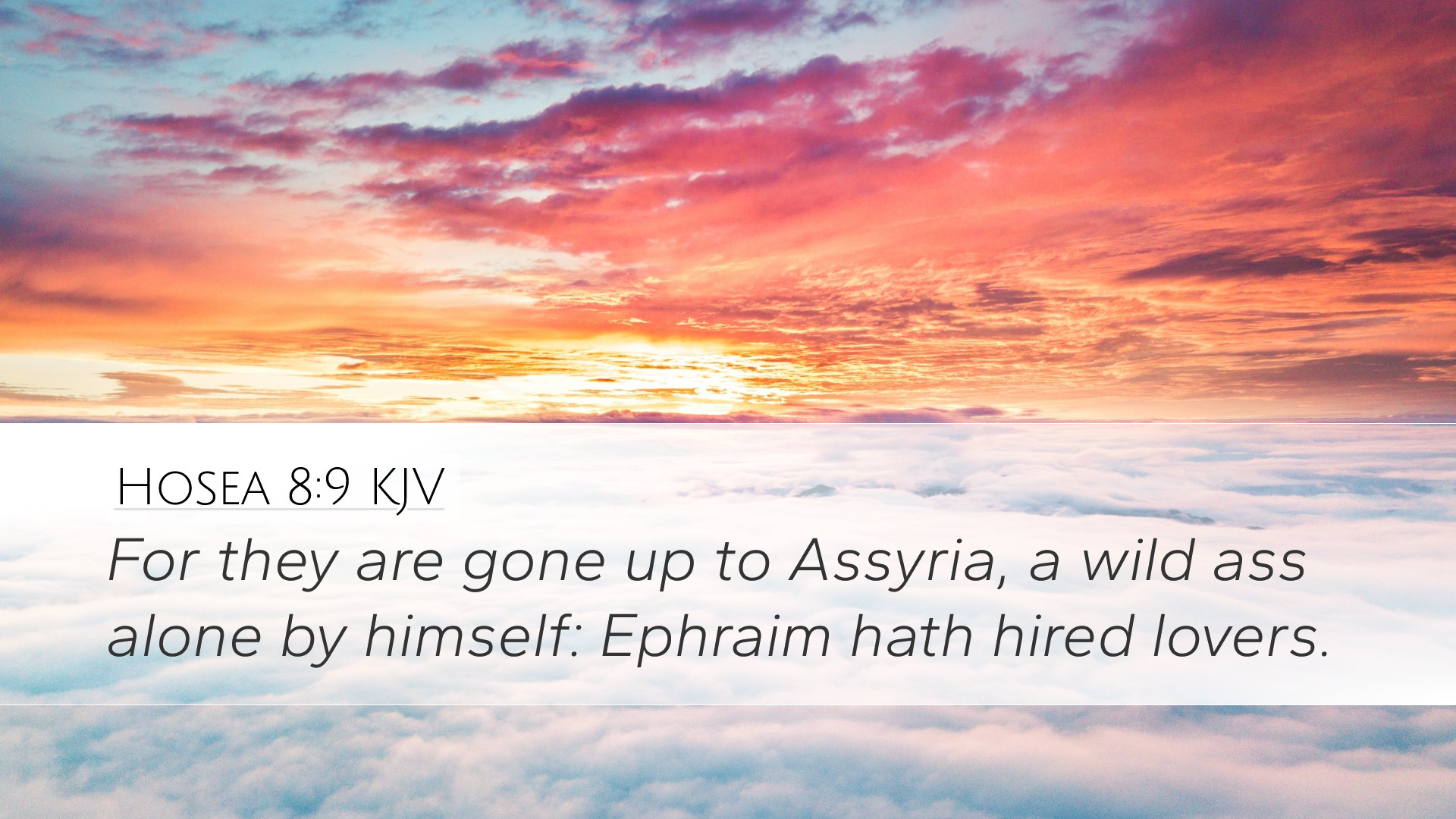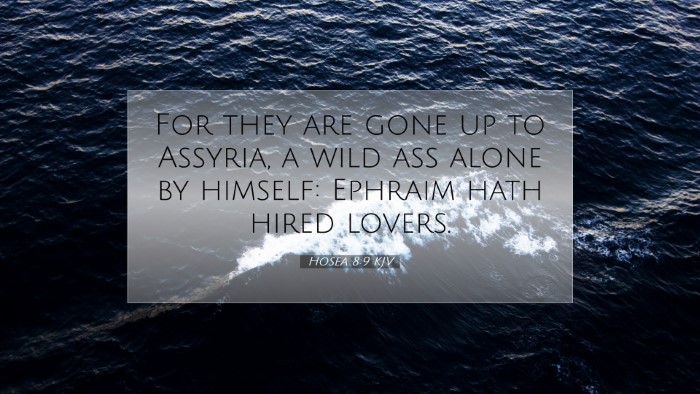Old Testament
Genesis Exodus Leviticus Numbers Deuteronomy Joshua Judges Ruth 1 Samuel 2 Samuel 1 Kings 2 Kings 1 Chronicles 2 Chronicles Ezra Nehemiah Esther Job Psalms Proverbs Ecclesiastes Song of Solomon Isaiah Jeremiah Lamentations Ezekiel Daniel Hosea Joel Amos Obadiah Jonah Micah Nahum Habakkuk Zephaniah Haggai Zechariah MalachiHosea 8:9
Hosea 8:9 KJV
For they are gone up to Assyria, a wild ass alone by himself: Ephraim hath hired lovers.
Hosea 8:9 Bible Commentary
Commentary on Hosea 8:9
Verse: "For they are gone up to Assyria, a wild ass alone by himself: Ephraim hath hired lovers." (Hosea 8:9)
Introduction
This verse encapsulates the state of Israel's unfaithfulness to God, comparing them to a lone and wild ass. Through the insights from various public domain commentaries, we will explore the theological and practical implications of this verse, examining God's desire for loyalty and the consequences of waywardness.
Contextual Background
The Book of Hosea is rich with prophetic imagery and intense emotions, articulating the covenantal relationship between God and Israel. Hosea's prophetic ministry occurred during a time of moral decay and social injustice, leading the northern kingdom, Israel (Ephraim), into spiritual and political unfaithfulness. This verse summarizes the crown of Israel's consequences as they sought alliances with foreign nations, specifically Assyria.
Exegesis of the Verse
Hosea 8:9 highlights two profound points in its imagery: The act of seeking assistance from Assyria and the metaphor of the "wild ass."
1. "Gone up to Assyria"
Albert Barnes emphasizes that the Israelites went to Assyria as a refuge, abandoning their reliance on God for security and salvation. This reflects a pattern of forsaking divine aid for human alliances, highlighting their distrust in God's sovereignty.
2. "A wild ass alone by himself"
Matthew Henry interprets the wild ass as symbolic of the Israelites’ isolation and independence from God. This animal, known for its untamed nature, signifies the reckless pursuit of freedom apart from divine guidance. The image suggests a people lost in self-reliance, wandering without purpose.
3. "Ephraim hath hired lovers"
Adam Clarke addresses the term "hired lovers," depicting Israel's adoption of foreign cults and alliances. The metaphor evokes imagery of infidelity, where Israel, likened to a spouse, seeks affection and support outside of its covenant relationship with God. This harrowing infidelity leads to the deterioration of both national identity and spiritual integrity.
Theological Implications
Throughout this verse, we uncover critical themes pertinent to theological inquiry:
- Covenant Faithfulness: The verse signifies God's expectation for His people to remain faithful within the parameters of the covenant.
- The Nature of Idolatry: The pursuit of foreign alliances exemplifies the broader theme of idolatry, where reliance on anything but God becomes an act of betrayal.
- The Consequences of Rebellion: Hosea 8:9 serves as a warning of the repercussions of straying from divine ordinance, portraying a nation in exile and suffering the consequences of its choices.
Pastoral Reflection
For pastors and spiritual leaders, Hosea 8:9 provides an opportunity for reflection on the dynamics of faithfulness in their congregations:
- Encouragement to Trust God: Address the dangers of seeking worldly solutions instead of relying solely on God's promises.
- Confronting Idolatry: Identify modern-day "lovers" that draw believers away from intimacy with God, such as materialism, politics, and societal influences.
- Cultivating Community: Foster community as a means of accountability and encouragement toward unwavering faithfulness to God's calling.
Conclusion
Hosea 8:9 acts as both a historical account and a prophetic warning that transcends time. Scholars, theologians, and students can glean from this passage the importance of covenant relationship, the danger of spiritual compromises, and the need for continual reliance upon God. As we meditate on this verse, may it rekindle our commitment to faithfulness, guiding our hearts toward divine truth and purpose.


